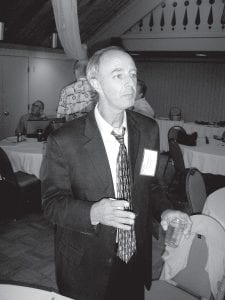Jerome Mayne: successful businessman, stand-up comic, mortgage broker, cancer survivor… convicted felon. After spending two years in federal prison for fraud a decade ago, Mayne is on a mission to help others avoid the slippery slope that led to his demise. How did he get there? By not listening to his gut and letting business ethics lapse.
On July 13, 2011, Mayne spoke to a group of county information technology directors from across the state at a conference held at Lutsen Resort. He travels the country helping people learn how to spot the red flags in their own lives that could lead them into trouble.
“To many of my friends and family, I became the guy they thought they knew,” Mayne said. “To my business associates, I became the guy they didn’t want to be associated with.”
What is fraud? Mayne explained that part of the meaning is to conceal information that should have been disclosed in order to deceive people, resulting in them doing something to “injure” themselves legally.
Eighty percent of reported fraud comes from inside an organization, Mayne said, and it can be something that is done without any ill intentions. One attorney, for example, borrowed money from a client’s account in order make payroll, knowing that he could and would pay it back in two days. He went to prison.
Anyone in the workplace who knows about a fraud that is going on (such as a “little” lie on a mortgage application) can be charged with conspiracy. Mayne’s mistake had to do with going along with misrepresentations on home mortgage applications— he knowingly processed six or seven fraudulent mortgage application documents for lowincome buyers over the course of seven months. He was drawn into it by an aggressive real estate developer who masterminded schemes to make big profits turning over properties, using applicants who weren’t really qualified and who weren’t really going to live in the houses.
Most of the time, the person committing fraud doesn’t plan to commit fraud ahead of time. Someone usually finds out what is going on, and the people involved are often investigated without their awareness long before they are arrested. Ninetyeight percent of these cases result in a conviction either through a guilty plea or a trial. For Mayne, his arrest took place years after he had moved on to build his own successful business, and it ended his business.
People make unethical decisions for two basic reasons, Mayne said: They convince themselves to do the wrong thing or someone else convinces them.
How con men con
Mayne said con men are “confidence” men: “They have a persona of sincerity.” You won’t necessarily see their con, but you will feel it, and listening to your gut is crucial. Mayne passed along a piece of advice he had been given: “Rarely does your instinct tell you to do the wrong thing first.” Mayne urges people to pay attention to the red flags in their minds. “We’ve got to learn to trust instinct without questioning it,” he said. Standing up to someone who makes you uncomfortable—calling their bluff—is very important.
Con men use five main methods to influence people, Mayne said:
Obligation and reciprocation: “I did something for you, now you owe me.”
Commitment: The con artist will get you to start saying yes to small, inconsequential requests and keep pushing a little at a time until you’re saying yes to things you’re uncomfortable with.
Implied authority and commands: “Do you know how important I am?” “Sit down." “Be quiet.”
Personal connection, attractiveness, and similarity: Mayne pointed out that the fact that sales people are usually good-looking is not a coincidence – they tend to have more influence, and successful salespeople also find a way to connect personally with their customers.
Convenience and distraction: “Busy people are easy prey,” Mayne said. The con’s message is, “I’ll help you out by making things easier for you, and I’ll distract you so you are confused about what’s going on.”
How people get onto the slippery slope
Mayne outlined numerous ways people start doing unethical things. They will try to get around the rules by “following details but missing the point.”
Common excuses include, “This is how we do it here,” “Everybody does it,” “I didn’t think it would matter,” and “No one got hurt.”
Mayne has become passionate about trying to help people avoid the mistakes he made. His ethical ideal is to be confident, passionate, genuine, sincere, honest, truthful, and trustworthy. His advice: “Laugh, learn, and leave the day better than you found it.”
More information on Mayne, the book he wrote about his experiences (Diary of a White Collar Criminal), and his public speaking can be found on www.jeromemayne.com.



Loading Comments